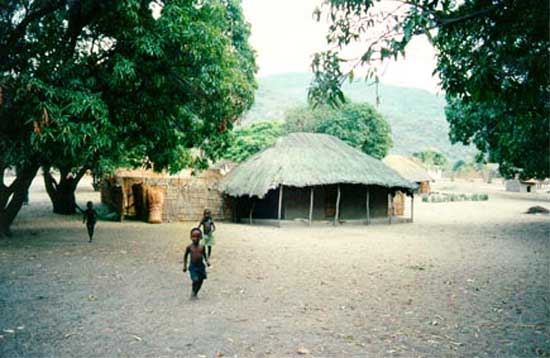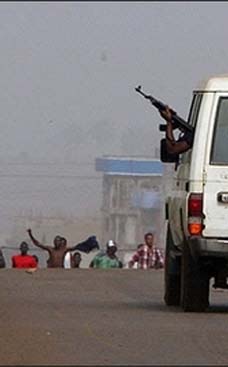
The program focuses on how to overcome social and economic barriers through entrepreneurship. For six weeks, students enrolled in the program study and live at Stellenbosch University, outside of Cape Town, South Africa. The students are divided into small consulting groups, ranging from two to four people. Each student participates in two groups. One group provides consulting to a for-profit business and the other to a non-profit business. The entrepreneurs are located in the black townships outside of Cape Town. While Brown was there, his for-profit consulting group worked with a man who ran his own welding business. Brown, a graduate student studying at Syracuse's Maxwell School of Citizenship, spent several visits getting to know the client, building enough trust to convince the client to share his bookkeeping.
Malawi RPCV Steven Thomas Brown spent six weeks in Syracuse University's Entrepreneurial Exchange Program with South Africa
Entrepreneurs create economic opportunity in South Africa
By: Dan Briggs
Issue date: 2/20/07 Section: Feature
Steven Thomas Brown lived in a mud hut in Malawi, Africa for two years, helping farmers increase their productivity. He was an outsider, serving under the Peace Corps and learning the indigenous Bantu language.
After completing his service and returning to the United States, it did not take long for Brown to find his way back to Africa. During his second trip, however, he experienced a different kind of social divide.
In the summer of 2006, the year after Brown finished the Peace Corps, he spent six weeks in Syracuse University's Entrepreneurial Exchange Program with South Africa. The program, run by the entrepreneurial department of Syracuse's Martin J. Whitman School of Management, teaches graduate and upper level undergraduate students how to create sustainable economic development in an environment with limited resources. One of the greatest barriers the students face is the residual racism from South Africa's apartheid government.
"It's still there, even in the dogs," Brown said. "The dogs (of some white owners) are taught that when a black person comes to the gate, it's a robber. If a white person comes to the gate, go up there and put your head down and slobber all over them. It's still there. You can feel it all around you."
The program focuses on how to overcome social and economic barriers through entrepreneurship. For six weeks, students enrolled in the program study and live at Stellenbosch University, outside of Cape Town, South Africa.
The students are divided into small consulting groups, ranging from two to four people. Each student participates in two groups. One group provides consulting to a for-profit business and the other to a non-profit business. The entrepreneurs are located in the black townships outside of Cape Town.
While Brown was there, his for-profit consulting group worked with a man who ran his own welding business. Brown, a graduate student studying at Syracuse's Maxwell School of Citizenship, spent several visits getting to know the client, building enough trust to convince the client to share his bookkeeping.
Language and cultural barriers made communication difficult. Initially, Brown and his client would sometimes run out of things to discuss while waiting for the program's transport service to return.
"But actually, I think in hindsight that helped to a certain extent, because if your client wasn't busy, you could sit there and have a liver sandwich with him," Brown said. "This other little entrepreneur down the way made these things called 'fat cakes.' It was just like a big doughnut but she'd stuff liver inside it, and Rebecca, my partner there, no way would she ever try it. But I'd go and get them, and my client would want to buy it for me, and we'd sit there and eat and chat, while you're waiting for the car to come."
An openness to new things helped Brown solidify a trusting relationship with his clients, making the consulting aspect of the program easier.
The consulting the students provide ranges from assisting with bookkeeping, to identifying potential clientele to assisting with changes in business plans. Students begin their consulting duties almost immediately after their arrival. Barring extenuating circumstances, each student visits both their clients once every week, for about four hours each visit.
The students also take two three-credit classes. In Supporting Emerging Enterprise, students learn about the context in which the program's entrepreneurs operate, as well as basic consulting practices. Entrepreneurship Field Experience, the other class, consists mostly of the consulting work the students perform.
Michael H. Morris, the Witting Chair of Entrepreneurship at Whitman, oversees the program. He expects the students to make substantive differences to the businesses they serve during the six weeks they are there.
"Probably two-thirds of these students aren't business students," Morris said. "They're from all over campus and from some other campuses. The issue is not that; the issue is you have got to be highly motivated. You have to want to make a difference, and you've got to have a sort of emotional maturity to adapt to a different cultural and social milieu."
Morris spent several years teaching at the University of Cape Town in South Africa in the early 1990s, shortly after the end of the apartheid. While there, Morris began a program that later became the model for Syracuse's program.
In 2005, Syracuse University Abroad (then the Division of International Programs Abroad) began to look into starting a summer management program in Africa. SU Abroad was interested in creating a new program in Africa because its only center on the continent, located in Zimbabwe, shut down in 2001 due to civil unrest.
A professor familiar with Morris' work at Cape Town directed SU Abroad toward Morris. SU Abroad and Morris began collaborating on what became Syracuse's current program.
In 2005, the program's first year, eight students attended, all of who were from Syracuse University. In 2006 the number of students doubled. The increase was due entirely to students from other universities who attended Syracuse's program, said Daeya M. Malboeuf, SU Abroad communications manager.
"That's indicative of how our programs are split," Malboeuf said. "About 50 percent of our attendants are from other universities. That's about 1,000 people a year who aren't from SU."
Kendyl G. Severino, a senior management major at Whitman, attended the program in 2006. She will be a teaching assistant during the program this summer. During her sophomore year, Severino took a class from Morris, who mentioned the program during a lecture. As the year progressed, Severino grew progressively more interested in attending.
"I think what most intrigued me, which I don't know if people got when they first applied, is that you're really making a hands-on difference in what you're doing," Severino said "You're actually, physically doing the marketing plans, or your physically doing the financials, and you're doing things yourself."
















